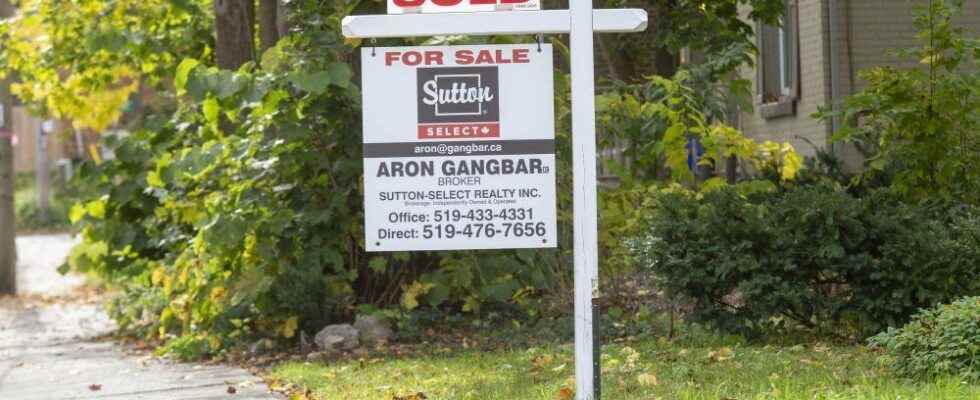In just one month, $76,000 was lopped off the average selling price of a London-area home – which works out to a whopping $2,500 per day.

In just one month, $76,000 was lopped off the average selling price of a London-area home – which works out to a whopping $2,500 per day.
The latest monthly real estate tale of the tape shows an astonishing cool-down in the London market, where homes that were selling for an average of $762,397 in May were going for an average of $686,287 in June. That’s part of a drop of nearly $139,000 in just four months following a local record high, $825,221, in February.
“In just six months, we’ve seen tremendous fluctuations,” said Randy Pawlowski, president of the London-St. Thomas Association of Realtors. “There’s no doubt that the market is moving more and more to a more balanced market. . . . Houses are not selling in seven days anymore, so everybody’s worked up.”
Blame it on the recent run-up in interest rates, he says, with the Bank of Canada having raised rates as it tries to control runaway inflation, significantly adding to the cost of borrowing money to buy a home.
For would-be buyers, many of whom had been frozen out of London’s red-hot market, the latest drop in average selling prices — the biggest single-month drop in recent memory — opens a big door to landing a place as long as they can afford the higher mortgage rates.
On the flip side, sellers shouldn’t bank on quick sales, over-asking prices or the frantic bidding wars some properties on the market saw only a few months ago. Instead, industry observers say, sellers should brace for properties taking longer to sell and their owners may need to return to the bargaining table.
“A lot of agents that I’m talking to just feel as though the tap has been shut off,” Pawlowski said. “We knew that these interest rate increases were coming, but they have come at drastic increases and fluctuations, and there’s still one more to watch out for.”
After setting its lending rate at historic lows at the start of the COVID-19 pandemic, the bank has now moved aggressively to raise the rate — which in turn impacts things like car loans and mortgages — as it attempts to bring rampant inflation under control.
The latest increase took place in June, when the bank increased its rate by 0.5 percentage points — the third straight increase this year — to 1.5 per cent. Some analysts believe the bank could raise its rate once more to 2.25 per cent this month.
The recent drop in prices blows in the face of projections made earlier this year by several industry watchers, including the Canada Mortgage and Housing Corp. (CMHC) and Royal LePage, both of which forecasted home prices would grow in 2022 albeit at a slower pace.
London isn’t alone in this trend, said Robin Wiebe, senior analyst with the Conference Board of Canada.
Larger markets such as Toronto and Vancouver have seen significant drops in home prices in the past few months, he said.
Besides interest rates, which Wiebe agreed is the main factor dragging down prices across the country, he said demand has also gone down as a result of how hard it was becoming to enter the housing market.
“There were lineups and few open houses, and sellers imposing strenuous conditions like sealed bids and no-inspection offers, and the buyers just have had enough. I think that’s part of it too,” he said.
“They have decided to rent for a little longer and wait for the market to settle down.”
But the cost of homes isn’t the only sign London’s housing market is losing steam after two frantic years that saw home prices nearly double and real estate agents break sales records almost on a monthly basis.
For instance, only 663 homes were sold last month in the London area, which takes in Strathroy, St. Thomas and Elgin and Middlesex counties. That’s the worst June in the past 10 years.
At the same time, more than 1,720 homes hit the market last month, increasing the housing supply to 2.8 months of inventory in June from 1.7 months in May.
“The market has definitely shifted,” said Phil Bailey, a real estate agent with Royal LePage, who said he’s had customers who got out of the market because they couldn’t afford the prices but are now looking for homes again.
“Some of the opportunities I’ve seen for buyers right now, I haven’t seen in probably two years or so,” he said.
“What I am seeing is that you can actually go to the table, you can negotiate again, you can put conditions again, so they just feel like it’s much more of a level playing field.”
Pawlowski said the recent decline in home prices may worry some buyers who got into the market when homes were selling for more, but he advised them to think about their purchase in the long term.
“If you compare to last year’s June, you’re going to see that we’re still up 10 per cent on the pricing year over year, which is reasonable and more in line with what the 10-year average was,” he said .
“So while we may be seeing some extreme fluctuations, I think at the end of the day it’s going to look pretty good when you look at the 10-year average.”
It was an opinion echoed by Wiebe, the Board of Canada’s analyst.
“If you have bought your house with the intention of staying in or for a number of years, there is every chance that the price will recover,” he said.
